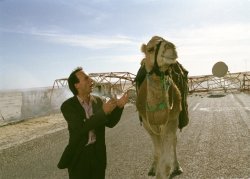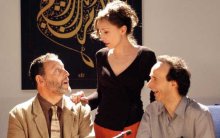When love conquers all, even war: On Roberto Benigni's The Tiger and the Snow
by anna battista

Whenever Italian director Federico Fellini was asked to say something intelligent about politics, he would say that he couldn't answer the question, because artists are a bit like sleepwalkers, and if you wake them up suddenly asking them where they are going and why, they won't be able to explain it and will look like idiots, like people out of their element. Remembering Fellini's words would be perhaps useful when commenting on the latest Roberto Benigni film. As soon as it came out in Italian cinemas, critics were disappointed they couldn't really compare The Tiger and the Snow (La Tigre e la neve) to a film by Michael Moore, or to a docu-film about the war in Iraq . Thing is that whoever labelled Benigni's The Tiger and the Snow as a "war" film, a "political" film, didn't get it quite right: the Italian director's latest movie is in fact about love, and the war in Iraq is just used as a background.
The film is about Attilio (Roberto Benigni) - a Rome university lecturer and poet who has just published an anthology of works entitled "The Tiger and the Snow" - who is madly in love with critic Vittoria (Nicoletta Braschi). Attilio practically lives for her: he follows her around everywhere she goes and dreams about her every night in a sort of Fellini-like bizarre dream in which he is marrying her among the ruins of some sort of castle, in front of an audience of poets while Tom Waits and a blues band play the languid "You Can Never Hold Back Spring". Unfortunately for Attilio, Vittoria couldn't care less about him, and keeps on trying to avoid him. In 2003, Vittoria goes to Baghdad to interview Iraq's leading poet, Fuad (Jean Reno) for a book she's writing, but she is wounded during an allied bombing raid. Without thinking twice, Attilio goes to Baghdad, and tries everything to save his beloved: he prepares a glycerine concoction to help her waking up from coma, finds oxygen where there is not even aspirin, dodges through minefields and crosses the desert to get more medicines, and ends up at a checkpoint, apparently kitted out as a suicide bomber, but actually carrying dozens of bags of intravenous solutions strapped all over his body.

It's surreal the way Benigni moves around this fictional war-torn Baghdad (the film was shot in Tunisia) with its legendary sky enlightened by missiles, around its streets with many closed shops and a few open bazaars selling everything except useful things. It's in this environment that Attilio the poet becomes a hero, perhaps a modest hero, but a hero all the same with a passion for life (he even manages to cheer up when the doctor tells him Vittoria's only got four hours to live, after all four hours can be a long time) and love.
Love is present also in the hundreds of quotes taken from various poets and hidden here and there: there are bits and pieces of poems by Abu Al-Tayyib Al-Mutanabi, William Blake, Pablo Neruda, Eugenio Montale, Giuseppe Ungaretti, and Jacques Prévert, to remember just a few. Even the name "Attilio" in the film is a tribute to Italian poet, writer and translator Attilio Bertolucci, father of famous directors Giuseppe and Bernardo Bertolucci.
The Tiger and the Snow is in a way an anti-war film - one of the most touching scenes is when Attilio finds the body of poet and friend Fuad who, in despair for what is happening in his country, commits suicide – but it's mainly a film about the encompassing power of love and about the hope that can exist even in times of tribulation. Hence, it's also the perfect film for the dark times we are living in.
Copyright (c) 2005 erasing clouds |
|